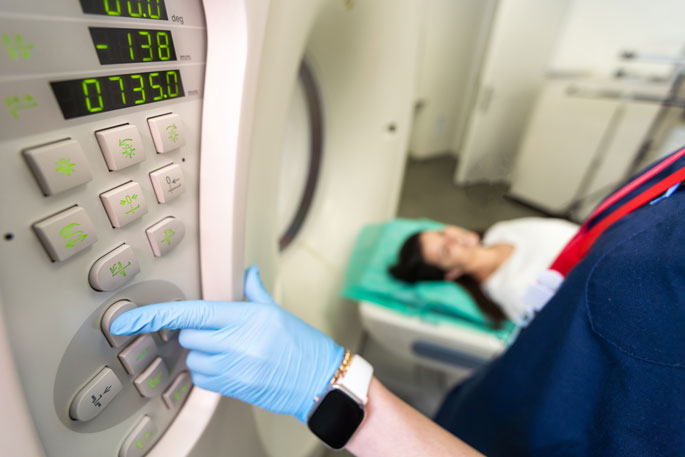Hospitals across the central North Island are struggling to overhaul unstable medical scanning technology, with the number of faults rising from 30 a year to more than 800.
Health NZ Te Whatu Ora admits there are risks to patients and is working on an upgrade, but OIA papers show a similar upgrade in another region became dangerous and slowed down the work.
The faults in the technology that radiologist doctors use to share and understand scan results - and that supports MRI, CT and ultrasound for hundreds of thousands of people in Waikato, Taranaki, Bay of Plenty and Tai Rāwhiti - is the latest example of fallout from under-investment in health.
Faults in this type of system have included misreporting and gaps in some people's scan results, which can lead to issues for radiologists.
"Any issues with instability and performance of those systems can present the potential for patient risk," Te Whatu Ora tells RNZ.
"We are committed to addressing this risk through this upgrade."
But earlier it stated that while faults were on the increase, "these do not directly impact patients or the safety of the patients".
They did contribute to complexities and challenges for clinical and administrative workers "and are not acceptable".
The agency took more than 18 months to answer RNZ's inquiries ongoing since October 2022.
It finally released OIA papers and statements that show by 2020, the faults across the region - Te Manawa Taki - were having major impacts on radiology services for extended periods.
"There have been significant ongoing performance issues... Managing these issues has also had a large impact on IT teams due to the amount of resource required to assist with troubleshooting and resolving issues," a 2020 report said of the decade-old technology.
It opted for an upgrade that was meant to be finished by 2022.
Instead, a radiologist whistleblower in Hawke's Bay raised the alarm about a similar upgrade in the southern North Island region, which had led to led to numerous "clinically dangerous work-arounds", clinical incidents and patient harm.
The health agency was finally forced to release a damning report last year.
The OIA showed the Hawke's Bay experience pushed Te Manawa Taki to review and change what it was doing last year. This has held up other scanning projects, such as a digital dental x-ray service in Taranaki, and ED ultrasound.
"We acknowledge the upgrade has taken a long time and we are committed to completing it this calendar year," Health NZ tells RNZ.
The OIA was sparked by a tip-off that said: "Public radiology in Waikato has a grim future sadly."
"Major anxiety now about installing" the new system, the 2022 tip-off says.
The region looked at a complete replacement in 2020, warning against a lengthy upgrade solution that "prolongs the risk currently being experienced", and could exacerbate it by trying to integrate an unstable old system with new products.
In the end, the health authorities opted to get the existing vendor Philips to do an overhaul, despite "concern around trust and confidence" with Philips.
In a statement, Health NZ says it did not need to launch a tender, as it's an upgrade and not a new purchase, but decided to seek an exemption from going to an open tender anyway.
It argued that going to tender would cost more and take longer - $5m over two years.
The untendered project has so far taken four years and is costing at least $3m, with Philips wearing some of the costs.
The number of faults in the existing system rose from 29 in 2019 to more than 500 in 2021, and more than 800 last year, the agency eventually disclosed to RNZ.
 Photo: Supplied.
Photo: Supplied.
HNZ has blanked out some key parts of the OIA papers.
"There is risk of introducing new platforms and risk of doing nothing," Te Whatu Ora tells RNZ.
Lack of expert staff to help the overhaul was a factor, as well as having to integrate with private radiology services that provided outsourcing for public hospitals.
"Due to the age of our PACS platform and the fact that incidents related to the PACS have been increasing every year, up by 300 percent over the past few years, we have to act to address the stability and supportability of this platform."
The current strategy is to adopt common national platforms.
The existing contract with Philips expires next month, then will roll over month-by-month. A Philips Intelliviewer PACS system was at the heart of the problems, HNZ says.
RNZ has attempted to contact Philips for comment.
The district is under other pressures from lack of radiologists - down to 23 this year from 28 in 2022 - and lack of the separate speciality of interventional radiologists. It's "totally unsafe for them", a source familiar with the situation tells RNZ.
Even back in 2020, Waikato was having trouble sustaining resources to manage the faulty tech, papers say.
Philips supplied one part of the old system, a company named Kestral provided a second part .
"Kestral remain unable to confirm root causes of various performance issues," a report says.
RNZ has approached Kestral for comment.



0 comments
Leave a Comment
You must be logged in to make a comment.